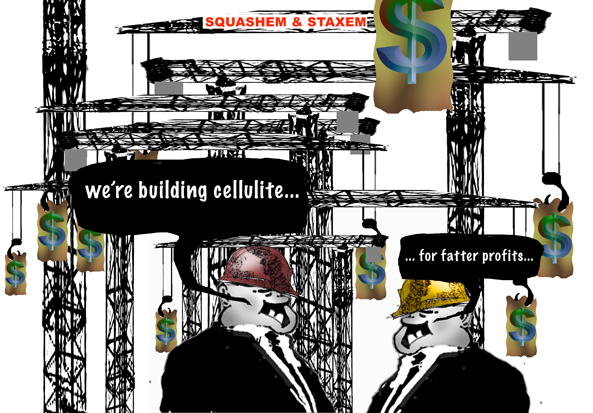Search
Recent comments
- churchill.....
5 hours 23 min ago - israhell breaks truce....
14 hours 50 min ago - early stages....
15 hours 39 min ago - lebanon....
15 hours 59 min ago - power gambit....
18 hours 14 min ago - a trumpish plan....
1 day 5 hours ago - war of earths....
1 day 6 hours ago - solitary confinement....
1 day 6 hours ago - losses.....
1 day 11 hours ago - "charity"...
1 day 14 hours ago
Democracy Links
Member's Off-site Blogs
chook coops, rabbit warrens and happy developers...

An international expert on planning healthy cities has warned Sydney against following the Asian model of concentrating high rise around train stations to house a booming population.
Dubbing it "suburban cellulite", the clusters of towers were designed to give maximum patronage to private railways and retailers, but are now being regretted by Chinese planners, says Guy Perry of construction firm AECOM.
"People are not happy there," he says.
Read more: http://www.smh.com.au/nsw/high-rise-living-at-train-stations-suburban-cellulite-warns-healthy-cities-expert-20151106-gkt23c.html#ixzz3qsBBQ4Mw
Follow us: @smh on Twitter | sydneymorningherald on Facebook
- By Gus Leonisky at 8 Nov 2015 - 3:00pm
- Gus Leonisky's blog
- Login or register to post comments
snaking under the suburbs...
"Tunnels below Parramatta Road would restrict the depths to which buildings could be constructed, in particular basements or footings for taller buildings," the EIS says. "This would restrict opportunities for urban revitalisation and improved liveability along and around Parramatta Road."
As well as Ms Makaritis and her neighbour Tarja Shephard, Labor's roads spokeswoman and Member for Strathfield Jodi McKay said she also feels misled by this aspect of the WestConnex project.
"I was told numerous times by the WDA that the reason for avoiding Parramatta Road had nothing to do with development," Ms McKay said. "They were categorical."
Ms Makaritis and Ms Shephard are concerned about the impact of construction below their properties. They are worried about the noise and vibration of underground drilling. "Our old federation homes are worthy of historical value and preservation," Ms Shephard said. "They have shallow footings, are very fragile and with crumbling lime mortar."
A spokeswoman for the WestConnex Delivery Authority said the route south of Parramatta Road was chosen because of its shorter tunnel length, ground conditions, and alignment with proposed later sections of the motorway.
The spokeswoman said the chosen alignment had the "potential benefit" of preserving "the Parramatta Road corridor for future urban renewal" but this was "not the reason it was selected".
The state government has delayed plans for the development of Parramatta Road. A consultation process on a new plan, however, is scheduled to start within the next few weeks.
"This was also made clear by the project team in both community meetings," the spokeswoman said.
Read more: http://www.smh.com.au/nsw/the-hidden-reason-westconnex-runs-near-not-under-parramatta-road-20150911-gjklmi.html#ixzz3qsLd2uae
Follow us: @smh on Twitter | sydneymorningherald on Facebook
on the way to the "free" market...
...
The new transportation bill will favor cars in other ways, too. Local highway projects will get an 80 percent federal match, but transit projects will get only 50 percent. Meanwhile, important sources of funds for transit, pedestrian, and bicycle programs, including TIGER grants and the Transportation Alternatives Program, were cut or imperiled.
While advocates of the road system regularly cloak their arguments in the rhetoric of choice and the free market, our transportation system is actually characterized by heavy government intervention on behalf of private vehicles. Massive, taxpayer-supported subsidies effectively bribe people to drive, and insulate them from the financial consequences their choices impose on others.
Drivers want more roads—as long as they don’t actually have to pay for them. The fact that there’s no stomach for increasing the gas tax—even though gasoline prices have fallen by more than a dollar a gallon in the past year—shows that when put to the test of the marketplace, there’s actually little demand for more transportation.
The irony, of course, is that transportation is clearly one policy area where traditional free market principles would put a serious dent in the problems of traffic congestion, air pollution, and safety. If car users faced anything close to the actual costs of building and operating roads (and mitigating or preventing the injuries and pollution effects), we’d see much less driving, and much less demand for additional capacity.
Joe Cortright is President and principal economist of Impresa, a consulting firm specializing in regional economic analysis, innovation and industry clusters. This commentary appeared originally at CityObservatory.org. City Observatory is an independent think tank on urban policy issues supported by the John S. and James L. Knight Foundation.
read more: http://www.theamericanconservative.com/urbs/house-republicans-asphalt-socialism/